

Many particle size measurements are made to track size reduction operations such as milling, mixing, homogenizing, etc. The size reduction unit operation is performed under set conditions or for a required time frame until a specified size is achieved, as determined by the measurement. The choice of particle size analysis technique can be based on the size distribution of the input, output, or both. Laser diffraction is the most common analysis technique for monitoring size reduction operations due to its very broad dynamic range. The LA-960V2 Particle Size Analyzer is uniquely capable of measuring from several millimeters down to the nanometer scale, making it the instrument of choice for many size reduction operations.
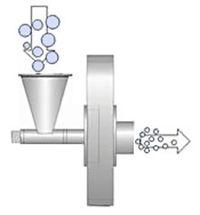
One method for particle size reduction is the use of Microfluidizers® which expose the material to consistent shear levels using a unique fixed-geometry interaction chamber (see www.microfluidicscorp.com).
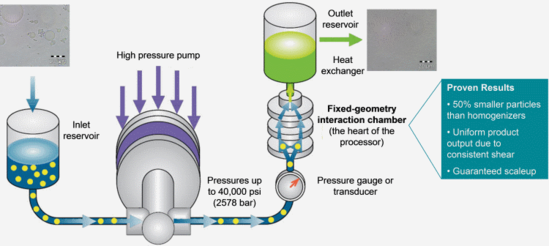
As depicted above, product is input into a reservoir which supports high solid content. A high pressure pump generates forces up to 40,000 psi (2578 bar) in order to force the product stream into precisely engineered microchannels within the unique interaction chamber. Because of the ability to control shear rates, the smallest pressure required is typically used. Once inside the chamber, product is exposed to consistent and intense impact and shear forces and then is immediately cooled. This repeatable process results in tiny particles with a uniform distribution.
One common use of a Microfluidizer® is particle size reduction of an active pharmaceutical ingredient (API). The images below show the particle size of the API before and after processing in the Microfluidizer®. The particle size analysis was performed using a HORIBA LA-910 laser diffraction analyzer.
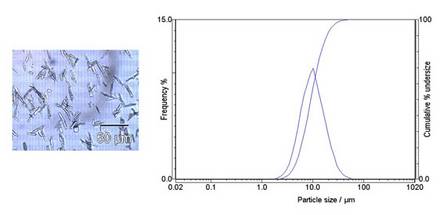
Before processing
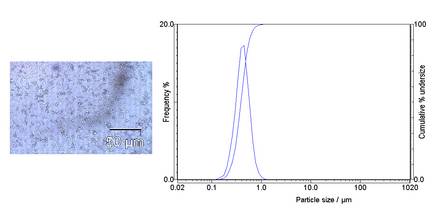
After processing: d50=385 nm
This technology is also commonly used to reduce the droplet size distribution of emulsions. The images below show the particle size of an emulsion used as an ophthalmic solution before and after processing. The particle size analysis was performed using a HORIBA LA-910 laser diffraction analyzer.

Before processing
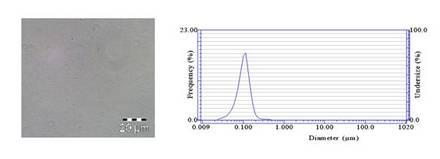
After processing: d50=96nm
Laser diffraction analyzers by HORIBA are often the best choice of instruments to track size reduction operations, in particular when the processed material may be below 100nm.
Laser Scattering Particle Size Distribution Analyzer
Laser Scattering Particle Size Distribution Analyzer
Do you have any questions or requests? Use this form to contact our specialists.